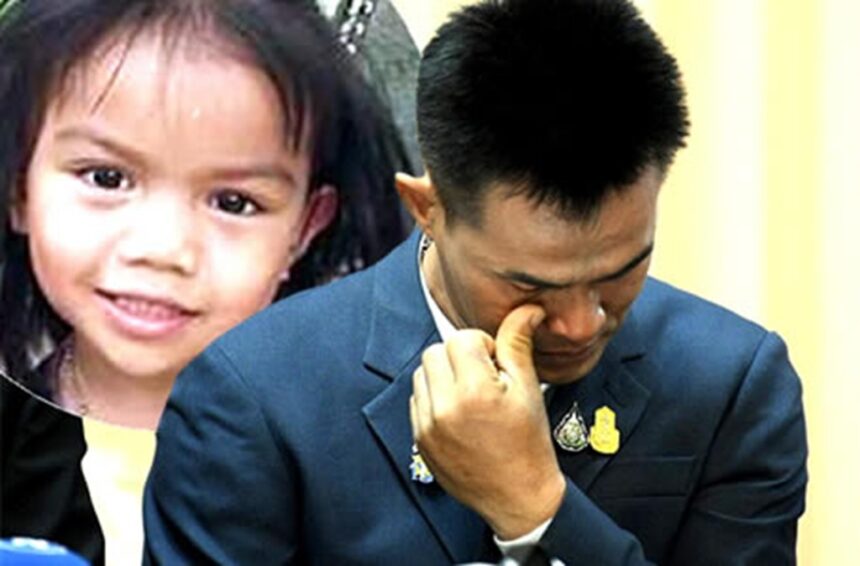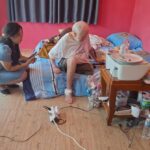MUKDAHAN, Thailand – The Court of Appeal in Mukdahan Province, located in northeastern Thailand, has delivered a new verdict in the highly followed case involving three-year-old Orawan “Nong Chompoo” Wongsricha.
Chaiphol Wipha, also known as “Uncle Phol,” has received a sentence of 26 years in prison. He was found guilty of premeditated murder, child abduction and hiding a body. This new decision overturns the earlier verdict of manslaughter and increases his punishment from 20 years.
The updated court ruling represents a major shift in a case that has held the attention of people across Thailand.
The story began on 11 May 2020 when Nong Chompoo, a young girl from Kok Kork village in Dong Luang district, Mukdahan, disappeared after breakfast. Her parents, Anamai and Sawittree Wongsricha, had gone out for chores, leaving her in the care of her siblings.
Three days later, her unclothed body was found on Phu Pha Yon mountain, about two kilometres from her home. The discovery deeply affected the local community and quickly drew national interest.
Local and national media soon covered the case daily, with channels like Thai Rath and Amarin turning the small village into the centre of public attention. Chaiphol Wipha, the uncle of Nong Chompoo’s mother and a rubber tapper, became a focus of media stories.
Death by Recklessness
At first, he was seen as a grieving relative and appealed to viewers’ sympathy. Donations from the public allowed him to build a new house and start a YouTube channel, “Lung Phol-Pa Taen Family”, which attracted over 358,000 subscribers.
As police and reporters examined his statements and actions, doubts grew. Discrepancies led to Chaiphol becoming the key suspect.
In December 2023, a court in Mukdahan sentenced Chaiphol to 20 years for causing death by recklessness and child abduction, clearing him of murder and acquitting his wife, Somporn Lappho.
But on 13 August 2025, the Appeal Court found that Chaiphol had deliberately left Nong Chompoo on the mountain, where she had no hope of survival. He was found guilty of premeditated murder, and the court denied Somporn’s acquittal. The harsher sentence showed the seriousness the judiciary placed on the case.
The Nong Chompoo story became a talking point throughout Thailand, receiving more attention than many TV shows. Many people first sided with Chaiphol, believing his emotional statements and the way he was portrayed in the media.
Over time, that changed. Evidence like 16 strands of Nong Chompoo’s hair found in his truck, along with witnesses placing him near the mountain, led to suspicion turning into blame.
The way the case was reported sparked debates about the impact of media coverage, with some saying that the reporting turned a tragedy into sensational news, putting extra pressure on investigations and the courts.
Nong Chompoo’s Death
The mystery of the case and the pain of Nong Chompoo’s parents sparked calls for justice on social media and in the press. Hashtags like #คดีน้องชมพู่ trended as people voiced their frustration and sympathy. Many discussed whether enough was being done to protect children in rural communities and whether sensational stories interfered with proper police work.
Nong Chompoo’s death is part of a wider pattern of violence against women and children in Thailand, which has grown in recent years. The Ministry of Social Development and Human Security’s 2024 report shows that more than 15,000 cases of child abuse and attacks on women are officially recorded every year.
Rural communities, like those in Mukdahan, have even more difficulties because of limited social support and stretched law enforcement, making residents more vulnerable.
Other cases, such as the 2022 murder of a 14-year-old in Chiang Rai and a 2023 assault on a young woman in Udon Thani, have led to more public concern. These incidents highlight long-standing problems, such as not enough safety nets for women and children, especially in remote regions where trust in neighbours can sometimes let criminals hide in plain sight, as seen in the Nong Chompoo case.
Thai officials have responded to the rising concerns. The Ministry of Social Development and Human Security has launched campaigns designed to raise awareness about child safety and domestic violence.
A key programme, “Safe Childhood”, teaches community leaders how to spot and report abuse. The police have set up dedicated units for cases involving women and children, working to speed up investigations and support victims.
Child Protection Act
In 2024, the government updated the Child Protection Act to create tougher punishments for offences against minors, including life sentences in severe cases. The Ministry of Education has also added child safety lessons to school timetables, aiming to help children recognize danger and ask for help. Some critics point out that these policies do not always reach rural areas, where there are fewer resources and less oversight.
Prime Minister Paetongtarn Shinawatra has called for stronger community involvement. In a recent speech, she said, “We must strengthen our villages to protect our most vulnerable. Justice for Nong Chompoo is a step, but prevention is our goal.” The government is working with NGOs to set up safe houses and support lines, such as the 1300 hotline, to help victims.
Many see the Appeal Court decision as progress, with Nong Chompoo’s family and supporters welcoming the tougher sentence after the earlier manslaughter conviction. Chaiphol’s lawyers plan to take the case to the Supreme Court, so the story is not over.
Thailand is left facing important questions about child protection. While the government has made changes, campaigners want more funds for rural services, better training for police, and cultural changes so victims come before the media spotlight.
Nong Chompoo’s death remains a symbol for many, urging action for a country where children are safer.
Related News:
Thai Court Sentences 70 Scam Gang Operators to Up to 24 Years in Prison














